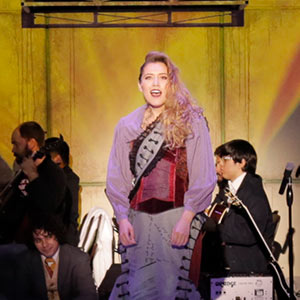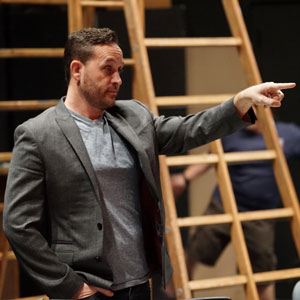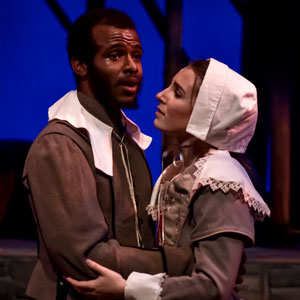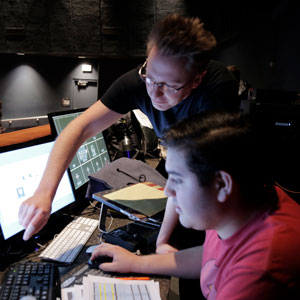FC Reveamps 'Crucible'
— Fullerton College Hornet - Christyne Brudos - Monday, October 26th, 1998It's party time. The heart throbbing beat of fun is moving you to feel that you haven't a care in the world. Or so you thought, as you're whisked off to some hidden dark part of man's soul to become a witness to a Salem witch hanging.
This new opening was added by the theater department to Arthur Miller's "The Crucible" at Fullerton College on Saturday Oct. 17.
Miller, a contemporary playwright, wrote his play in response to now-censured Senator Joseph McCarthy's infamous trial hearings against "un-Americans" in the 1950s.
These hearings challenged American citizens' loyalty to the United States and accused many to have communist ties, something akin to treason today.
Miller, among the accused, insightfully understood the consequences of the mass hysteria of these trials which could render an individual's undeserved demise at the point of a public's collective finger.
Based on a true historical event, "The Crucible" explores the affects of mass hysteria in Salem Massachusetts in 1692.
It was during the time of the infamous Salem slaughter where many innocents were burned, drowned, pressed or hung to death merely because they were pointed out to be witches.
The audience witnesses a hanging in the end, representing one of many murders of the Salem witch trials.
Director Dan Lemieux's incorporation of 1990s partyers along with contemporary slides and music added a profound dimension to the play. The "Chinese Box" approach, or having an audience watch a play within aplay, showed outside partyers watching a moment in history.
As soon as the hanging is over, they quickly get back to partying with no evident affect on any one of them.
According to Lemieux, "history repeats itself because people think, 'It's not going to happen to me.'"
Slides, designed by Robert Jensen, were used as backdrops to the scenery. Parallel historical events to the witch hangings were shown between the scenes of "The Crucible" play
The slides, along with a pounding heartbeat of contemporary music, by Bradley Enochs, provided powerful media to convey the theme of history repeating itself.
The stage scenery did partially block the slide projections, however, which took away part of their impact.
The slides, too, needed more focus on the McCarthy hearings since Arthur Miller's inspiration for "The Crucible" came from that event.
The only prominent slide was a headshot of McCarthy, which would only be recognizable to those who knew about the event.
All in all, a powerful interpretation which created a fertile ground for the artists involved.
Two actors, Brianne Gates and Alicia Lorraine Derrick, gave professional performances.
Gates played Abigail Williams a vindictive 17-year-old orphan in the care of her uncle Reverend Parris. She presented a struggling and pas-ionate character with such intensity that her body slipped into a seemingly uncontrollable tremble in one scene.
With obvious inner character study, Gates accomplished the awareness of playing to the audience yet appeared to remove the audience from her reality at performance time. Her reality was so concrete, she was able to maintain her 17th century tongue which others had trouble with, especially at emotional moments.
Keeping focus, Gates' movements were appropriate to the stage as opposed to television or film. She also never confused "intensity" with "loudness" as.was witnessed in other characters.
It was Gates' strength that led the powerful courtroom scene among the women. Yet actors: Jennifer Alise Blasich, Sarah Dunkerly, Devin Anne Fend, Lauren Tamiko Ito, along with Gates each had such a collective energy, it emitted aradiance throughout the house.
Alicia Lorraine Derrick (Alicia Lorraine D.) played Rebecca Nurse, a 72-year-old who is respected in the town for her compassion.
Lorraine D's depiction of an elderly lady was so genuine, only the presence of stage make-up revealed her younger age.
Always in character, her natural movement and speech blanketed a mother-like feeling over the whole cast.
Honorable mentions: Jonathon Petersen, once in momentum, delivered a powerful performance; Erin >McReynolds who remained focused; Michael Hampton with his polished lines; and, Kevin Covey.








